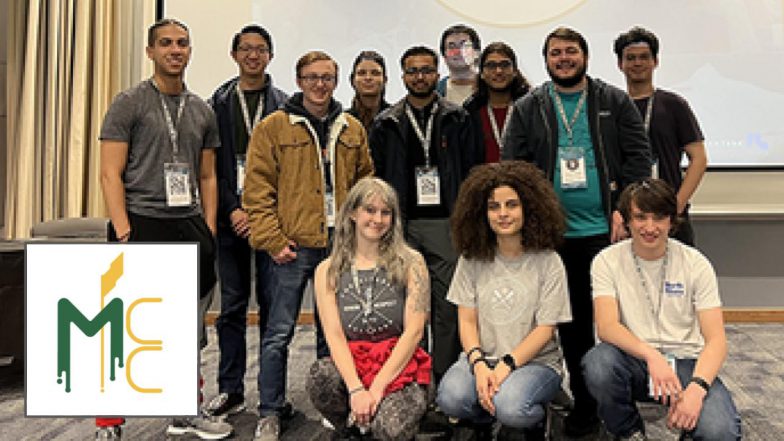Summary
Mason Competitive Cyber (MCC) is a student club at George Mason University for students interested in cybersecurity and competitive hacking, offering skills-based learning and participation in events like Capture the Flag (CTF) competitions. The club provides professional development through tech talks from industry partners and connects members with alumni, while also organizing its own large-scale events, such as the PatriotCTF international competition.
- Purpose: To learn, practice, and compete in various types of cybersecurity competitions, including CTF, Network Defense, and Forensics.
- Activities: In addition to competitions, the club holds meetings for skills-based learning, hosts talks from industry professionals, and organizes social events.
- Membership: It is open to all students, including those in technical and non-technical majors, and has a large online and active in-person membership.
Source: Gemini AI Overview – 11/1/2025
OnAir Post: MCC- Mason Competitive Cyber
News
The George Mason University team Mason Competitive Cyber scored first, second, and fourth place at the Cyberforge 2024 competition held on February 11-12. During the two-day conference students heard from industry professionals and enhanced their cyberskills by competing in the Capture the Flag (CTF) competition.
“Winning a Virginia-wide competition is pretty good news by itself,” said Cyber Security Engineering Department Chair Paulo Costa. “CyberForge is especially important due to the quality of the teams, the level of effort every team and associated organizations/universities put into it, and the impact it has in the Virginia cybersecurity space.”
Costa consider this one of the two most important competitions in the area. The other is Virginia Military Institute’s Cyber Fusion event happening later this month on February 23-24.
The Cyberforge event featured companies such as MITRE, CCI, G2OPS, HAK5, CompTIA, Virginia Cyber Range, WiCyS, TCM Security, and more. The Mason students competed against top collegiate teams and industry professionals from around Virginia. Students value competitions as these events allow them to meet talented students and industry professionals outside their home institution.
The team won multiple different prizes, including but not limited to Canakit raspberry pi 5 kits, CompTIA vouchers, and HAK5 gift cards, but they are most proud of the winner’s plaque, which they hope to display in the department’s office.
Students choose George Mason University for a variety of reasons. Computer science sophomore Jax Dunfee came to Mason because of its strong competitive cyber club. Dunfee’s interest in competitive cyber began in high school and has continued into his college years. “When I was looking for colleges, I saw that Mason had a competitive cyber team. So, I investigated it, thought it was cool, looked into it more, and joined when I got here. I’ve always been into cybersecurity and competitive cyber is a great way to improve my skills.”
The Mason Competitive Cyber (MCC) club is open to all and though it mostly comprises students in technical majors, the club welcomes everyone. The group meets twice weekly—virtually on Wednesdays and in person on Fridays. The Friday meeting sometimes includes presentations or talks from industry sponsors or professionals.
The club also competes in person at events sponsored by other universities like Virginia Military Institute and Virginia Tech. In September, MCC hosted its own international Capture the Flag (CTF) event that attracted more than 3,000 participants and over 1,600 teams. If you’re looking for the heart and soul of MCC, you’ll find it at CTFs. They’re also one of the best ways to learn about hacking and cybersecurity.
“The events are how we put theory in practice,” said Dunfee. “In classes, a lot of times you learn programming that builds a baseline for what you’ll be doing in the industry, but frequently you don’t have a lot of time to do that–put that theory into practice. But with CTF you get hands-on activities with your teammates and others.”
Dunfee describes CTF as a variety of challenges that can range from web app exploitation, binary exploitation, cryptography, or reverse engineering forensics. Teams receive a challenge and a description, that they must solve and then get a flag, and the flags are redeemed for points. The team with the most points wins.
Students who are interested in learning more about MCC can check out the website or attend one of the meetings. “We’re always looking for members,” said Dunfee. No experience necessary.
About
Web Links
Key activities and accomplishments
- Competitions: The club competes in events sponsored by other universities and organizations, like the Cyber Fusion competition, and has achieved high placements.
- PatriotCTF: MCC hosts its own international CTF competition called PatriotCTF, which has attracted thousands of participants.
- Professional development: The club connects members with corporate partners through tech talks and professional development opportunities.
- Alumni support: Graduates in cybersecurity fields regularly give back to the club by speaking to members and hiring current students.


